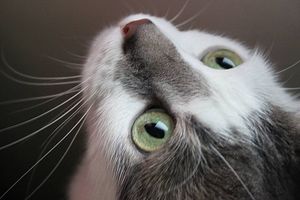Contionary:lú: Difference between revisions
Jump to navigation
Jump to search
m (→Lifashian) |
m (→Pronunciation) |
||
| Line 20: | Line 20: | ||
===Pronunciation=== | ===Pronunciation=== | ||
: (''Standard'') [[Guide:IPA|IPA]]: {{IPA|[luˤː]}} | : (''Standard'') [[Guide:IPA|IPA]]: {{IPA|[luˤː]}} | ||
: (''Helenopolitan'') [[Guide:IPA|IPA]]: {{IPA|[ | : (''Helenopolitan'') [[Guide:IPA|IPA]]: {{IPA|[lə͡ɯwˀ]}} | ||
===Numeral=== | ===Numeral=== | ||
Revision as of 16:18, 11 March 2022
Anrish
Etymology
From Middle and Old Anrish luh, from Proto-Germanic *luhō ("lynx")
Pronunciation
(Anrish) IPA: /luː/
Noun
lú (runic:‧ᛚᚢ‧)
- Any member of the family Felidae, but more specifically the domesticated cat (species Felis catus)
Inflection
| Ⅱ | ɴᴏᴍ. | ɢᴇɴ. | ᴅᴀᴛ. | ᴠᴏᴄ. |
|---|---|---|---|---|
| sɢ. | — | — | —ʟ | —ʟ |
| ᴘʟ. | —ʟ | —ɴ | —ıb | —ʟ |
| ᴄᴏʟ. | — | —ʟ |
Lifashian
Etymology 1
From Proto-Indo-European *dwoh₁, *dwéh₂h₁e, *dwóyh₁. Cognate of Latin duo, English two.
Pronunciation
Numeral
lúˤ m (feminine luwáˤ, neuter luyóˤ) (ordinal sfetás or halyás; adverbial lis; distributive liséh)
- two
- Lú syuni mey tosy kisolé denát.
- Two dogs are running in the courtyard.
- Lú syuni mey tosy kisolé denát.
Inflection
| Declension of lúˤ (numeral, plural) | |||
|---|---|---|---|
| Masculine | Neuter | Feminine | |
| Nominative | lúˤ | luyóˤ | luwáˤ |
| Genitive | lúˤsy | luwáˤs | |
| Dative | lúˤy | luwáˤy | |
| Accusative | lúˤm | luyóˤ | luwáˤm |
Related terms
- nyé (one)
- teri (three)
- sfetás (second (of many))
- halyás (second (of two))
- lis (twice)
- liséh (two each)
Etymology 2
From Akkadian dû, ultimately from Sumerian du.
Pronunciation
Noun
lú m (first declension)
- hill
- Mey lúé nyá lámá monutá esti.
- There's a little house on the hill.
- Mey lúé nyá lámá monutá esti.
Inflection
| Case | Singular | Plural |
|---|---|---|
| Nominative | lú | lúi |
| Genitive | lúé | lúám |
| Dative | lúí | lúuwi |
| Accusative | lúom | lúás |
